Dan Brillman (CEO) and Taylor Justice (President) are the co-founders of Unite Us, a unicorn, outcome-focused technology company that builds coordinated care networks of health and social service providers. Both having served in the military (Dan is in the Air Force Reserves and Taylor is a U.S. Army Veteran), they started the company in 2013 to fix a system they knew was broken. The company was founded to serve veterans and has grown into a national movement in communities to connect anyone to the care they need.
What does “entrepreneurship” mean to you?
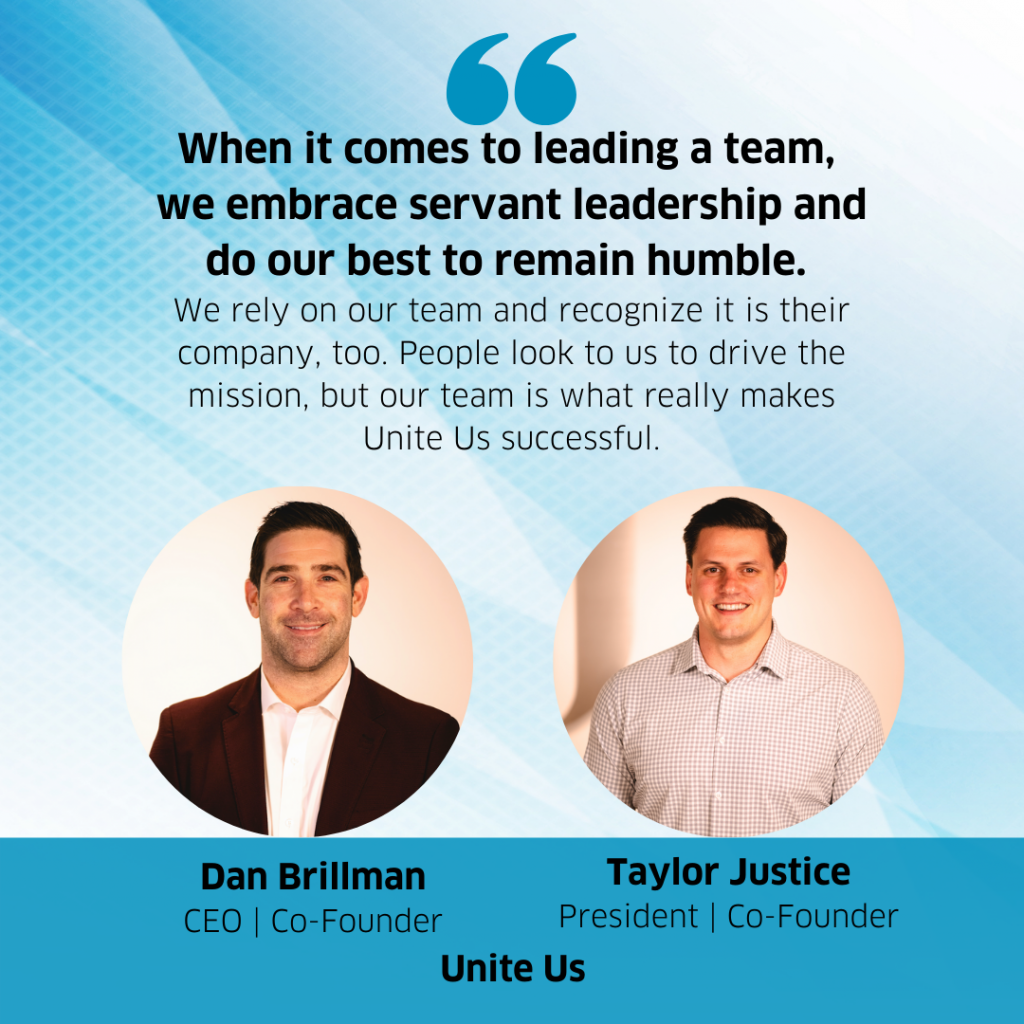 Dan Brillman: For me, entrepreneurship is all about taking something that you’re passionate about and turning that into real life action and opportunity. There isn’t a blueprint on how to build a business. It’s how you react, how you build your team, how you build your culture and stay focused on your mission and problem to solve — and that’s going to set you up for success.
Dan Brillman: For me, entrepreneurship is all about taking something that you’re passionate about and turning that into real life action and opportunity. There isn’t a blueprint on how to build a business. It’s how you react, how you build your team, how you build your culture and stay focused on your mission and problem to solve — and that’s going to set you up for success.
Taylor Justice: Entrepreneurship is about doing something that’s never been done before and solving problems in a surprising manner. It doesn’t have to be about starting a company, which is how we typically tend to view entrepreneurship. It can be a mindset and way to approach everyday problems.
How did your company come to be?
DB: Creating our company felt like a destiny moment, as cheesy as it sounds. Taylor and I were two separate individuals who were analyzing the same problem and wanting to do something about it. Through our personal experiences in the military, we saw how inefficient it was for returning veterans to get support, locate new jobs and find new places to live for their families. We were connected through the military veteran group at Columbia University and realized our joint passion. At the time, I was writing a paper about the fragmentation of health and social services and how to connect them in a coordinated system, while Taylor was volunteering at a Philadelphia non-profit helping veterans. We’ve been attached to the hip ever since that first meeting.
TJ: We both had witnessed the lack of support for the veterans and families around us. We shared the same frustration with the status quo and wanted to do something about it – so we started Unite Us.
How has your business changed in response to the COVID-19 pandemic?
TJ: It isn’t so much that our business has changed but rather the market. In response to COVID-19, governments and communities woke up and realized the lack of investment historically made into human and social services. The pandemic brought into glaring focus the disparities that we’ve been talking about since we started. Unite Us was uniquely prepared to act once stakeholders became aware of the problems. Our company quickly grew in response. We started the pandemic with just one state service and now we’re at 16. We scaled and built an infrastructure to address needs in real-time through “rapid response networks” that focused on emergency basic need providers. Our team has grown 7x in under two years, and a majority of that has happened in the past eight months because the need is so great.
DB: COVID-19 acted as the fuel that ignited Unite Us’ growth, accelerating the need for our products, services and infrastructure. People that we talk to are no longer asking “why” but are asking “how” and taking it three steps beyond. We’ve had amazing conversations around what’s the best way to structure this work and have an impact. We’re excited to elevate these community organizations even further and ensure they’re the same priority level as medical care.
What is your proudest and darkest moment so far? Share a key high and a key low from your journey if you can.
DB: Three years ago, we were on a prospective client call and the client was more determined to check a box than make a true change by partnering with Unite Us. I sat down after that call and realized what we were doing was way ahead of the market and people didn’t yet see the true value in it.
TJ: I remember a similar instance with a large deal that would have made a huge impact in making care more accessible to the veteran community. At the last minute, they threw the deal away and went with another tech solution. I remember crying about it because it was something that had the potential to catapult care and Unite Us. It hurt because it was a missed opportunity for all parties. In the end, the deal they pursued didn’t succeed and many people were impacted because they didn’t end up getting the care they needed.
DB: The bright side for both instances is that it brought to light issues we needed to address and drove us even further to continue making a change. The market is maturing quickly in front of our eyes.. Since these conversations, we’ve rapidly grown and closed deals that have made an immense impact.
How is your company changing the landscape?
DB: Since we founded the company in 2013, Unite Us has been working to dismantle the barriers that exist between health and social care providers. We’re building secure, collaborative, community-wide systems that truly improve health outcomes and people’s lives overall. Unite Us is dedicated to bringing services that impact health – such as housing, food assistance, behavioral health, utilities and transportation – to the same priority level as traditional healthcare. We’re looking to lead a collaborative movement that breaks down silos and improves health nationwide as a new type of infrastructure that supports people’s needs.
TJ: We’ve also created the industry’s first end-to-end solution to accelerate the investment and impact of social care services across the nation, and place people at the center of community-focused care. Our platform extends the traditional clinical care coordination network by including human and social service agencies.
What do you wish you knew when you started? Is there anything you would do differently?
DB: I don’t think there is anything we would have changed along our journey. What makes a successful entrepreneur and company is the ability to overcome change. You can’t control a global pandemic, the market or other chaotic situations. All those situations inspire learning moments that mold your growth and resilience.
TJ: Something I wish I knew when I started was to set clear boundaries and always have a contract in place when working with someone. It is great to get help from friends and those in your community, but I’ve run into issues over time when having a strong personal relationship and working with someone. It’s always good to have it on paper!
What advice/credo do you live by as you grow the business / what is your professional and personal mission statement?
DB: One person, department, or organization in the community cannot solve everything on their own. It takes every single person on the team and the community together to make change. You have to build the best team and product and be a servant leader in how you lead that team to support your solutions scale and innovation.
Where do you find inspiration when faced with challenges?
DB: We lean on each other a lot. We’re always there to support one another and provide advice when things get challenging. We both also look to our larger team and families for encouragement. It’s all about who you surround yourself with.
TJ: The one thing you do have control of despite peaks and valleys is who is with you to navigate the highs and lows. We’ve built a team that I’m proud to navigate challenges with.
What does “success” look like for you? What do you think will help you achieve it?
TJ: “Success” to me is about making a real impact. For us, that means a collaborative, community-wide public health infrastructure that caters to the individual and allows them to navigate health and social care with ease. If we can extend support networks beyond clinical support, but rather holistically, I would say we’ve found success. Getting organizations across healthcare, government, and social services to effectively collaborate is what will help us achieve that.
DB: For me, success is expanding our public infrastructure to ensure people get the services they need, regardless of who they are. Putting people at the center of community-focused care. To Taylor’s point, this requires greater multiple stakeholders coming together and coordinating around an individual in need.
Has personal or professional “success” changed for you since the COVID-19 pandemic?
TJ: Professional success has certainly changed in response to the pandemic. It’s always been about helping communities but that came into major focus for us. The first order of the pandemic was to address the clinical response to COVID-19. But the second and third order was the unprecedented stress on human and social service systems. We were in the fortunate position to be able to respond to those needs and deploy infrastructure.
DB: The pandemic has accelerated the country’s focus on reducing in equities and bringing better access to care and services for people in need. Professionally, we built the right product to respond to this and build solutions that will become a standard for generations. It was always personal but since every person in this world was dealing with the pandemic, we became even more passionate to execute and scale to meet the market’s demand. Personally, I still don’t feel we have succeeded yet. There is so much work to do and we feel like we’re just getting started.
What’s it like to work alone or with your partners? What advice do you have for fellow entrepreneurs about building and leading teams?
TJ: Dan and I do different things within the company and look at things through different prisms. For example, I can get emotional and reactive while Dan is more level-headed. While we may not have the same initial reaction or thoughts about a problem, we complement one another and know how to approach problems with that in mind. We trust each other and know that we want the same end goal which is what matters most.
DB: When it comes to leading a team, we embrace servant leadership and do our best to remain humble. We rely on our team and recognize it is their company too. People look to us to drive the mission, but our team is what really makes Unite Us successful.
Many entrepreneurs continue to perfect their daily routines to support their work and greater vision; would you mind sharing your morning routine or a regular ritual that grounds your work each day? How has it changed in recent months?
DB: What drives me as an entrepreneur is ideating with others. I regularly check in with fellow teammates every morning to ensure I have a pulse of what we continually need to improve on internally and how our solutions are impacting communities. Every person at Unite Us has amazing ideas that will help us continue to scale and improve our solutions so ensuring I absorb them daily is key to how we continue to innovate.
What keeps you motivated during this time?
TJ: Our work started in the community and was fueled by personal passion. I served as an entry officer in the US Army and unfortunately was medically discharged. Through that experience, I dealt with the inefficiencies connecting veterans to employment and education, dealing with the VA and the general lack of support throughout that network. Unite Us began by serving veteran and military populations, and now, we serve all populations across 42 states to make health care better for everyone. Remembering why we started in the first place is what keeps me motivated.
DB: I agree with Taylor in that remembering why we started is my source of motivation. It’s a nightmare for veterans, and so many others, to attempt to navigate the world of healthcare and social services. Hearing stories about individuals and families Unite Us has helped is what keeps me going day in and day out. One story that comes to mind is when a member in our health plan was incarcerated but later discharged because he tested positive for COVID-19. For context, depending on the level of your crime, you might not be eligible for government assistance during the re-entry program, making you heavily reliant upon the nonprofit community to facilitate care. Questions such as where he was going to live, where he would get his food supply and whether or not he could be connected to a primary care physician arose. Through Unite Us, he was discharged within 48 hours, had a place to live, received medical supplies connected to a primary care provider and had transportation set up for him. Moving forward, we put him into the local Department of Labor for workforce opportunities. It is in this one case that we see the importance of building infrastructure that tends to all the individuals needs and in a timely manner.
What kind of entrepreneur do you want to be known as, as in, what do you want your legacy to be?
TJ: I want my legacy to be about helping make healthcare more about human care. I hope to have played a role in connecting health, human and social service organizations together to improve health nationwide.
DB: I want my legacy to be that I helped drive change within the health and social care space—and partnered with the right people along the way to make it happen. Unite Us’ first value is “Be A Good Human,” which is about bringing on-board really good, trusted people and encouraging autonomy for them to come up with innovative ideas. If I am able to empower others to see this mission through long after I’m no longer here, I will have succeeded.
What is a quote or some words of wisdom that help get you through the tough days?
DB: Tomorrow is another day. Don’t hang on to the past.
Have you experienced mentorship in your career? Do you feel it was easily available to you?
TJ: The West Point network provided excellent mentorship for me when I was medically discharged. I had to navigate through the difficulties of dealing with the VA, finding a new job and place to live. Fortunately, I was able to rely on the West Point network, landed a job in Philadelphia and quickly got involved locally.
DB: Mentors can be hard to find as you don’t know exactly what you need in each stage of growth. In each stage of growth, there were different problems to solve personally and professionally. I have been lucky to have personal and professional mentors throughout my career that have helped me in different angles of the business from technology, scaling businesses, market expertise and leadership but you have to seek them out and ask the right questions to get the support you need.
Who are the people who have mentored or influenced you in your life or career? How has their influence changed the trajectory of your entrepreneurial journey?
DB: My wife and mother have been instrumental in my growth as a person and professional. My wife as a finance professional and investor helps me strategize and mentor me on what I should be thinking of next in each stage of growth. My mother is a lifelong entrepreneur that grew several healthcare businesses. Through our early phases, she continually mentored me on what to expect next, how to build infrastructure so you can scale and how to build a team.
Do you have someone you’d like to nominate to be profiled in our Faces of Entrepreneurship series? Please let us know by emailing media@thecenter.nasdaq.org.
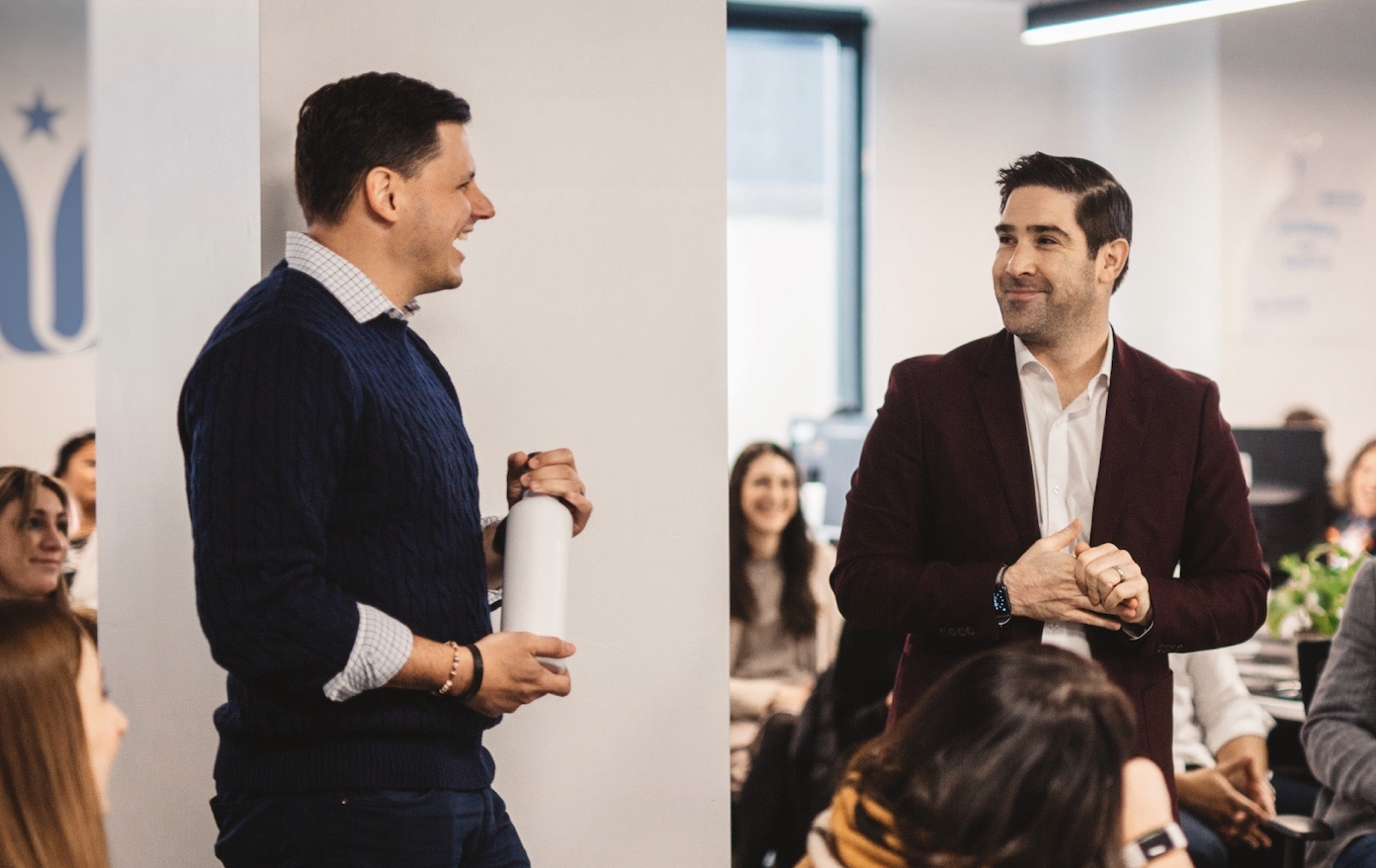
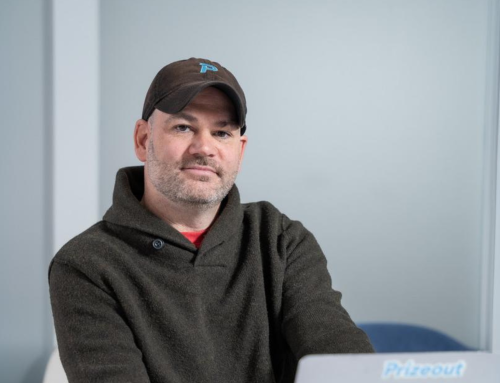
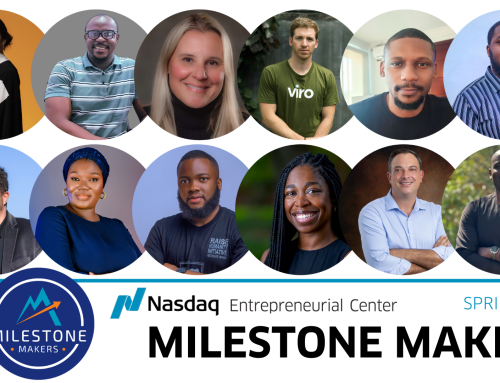
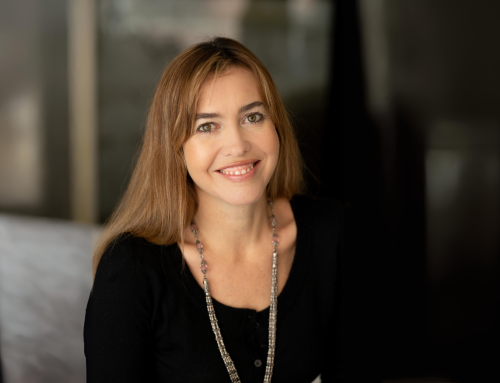
Invite a Friend
Close